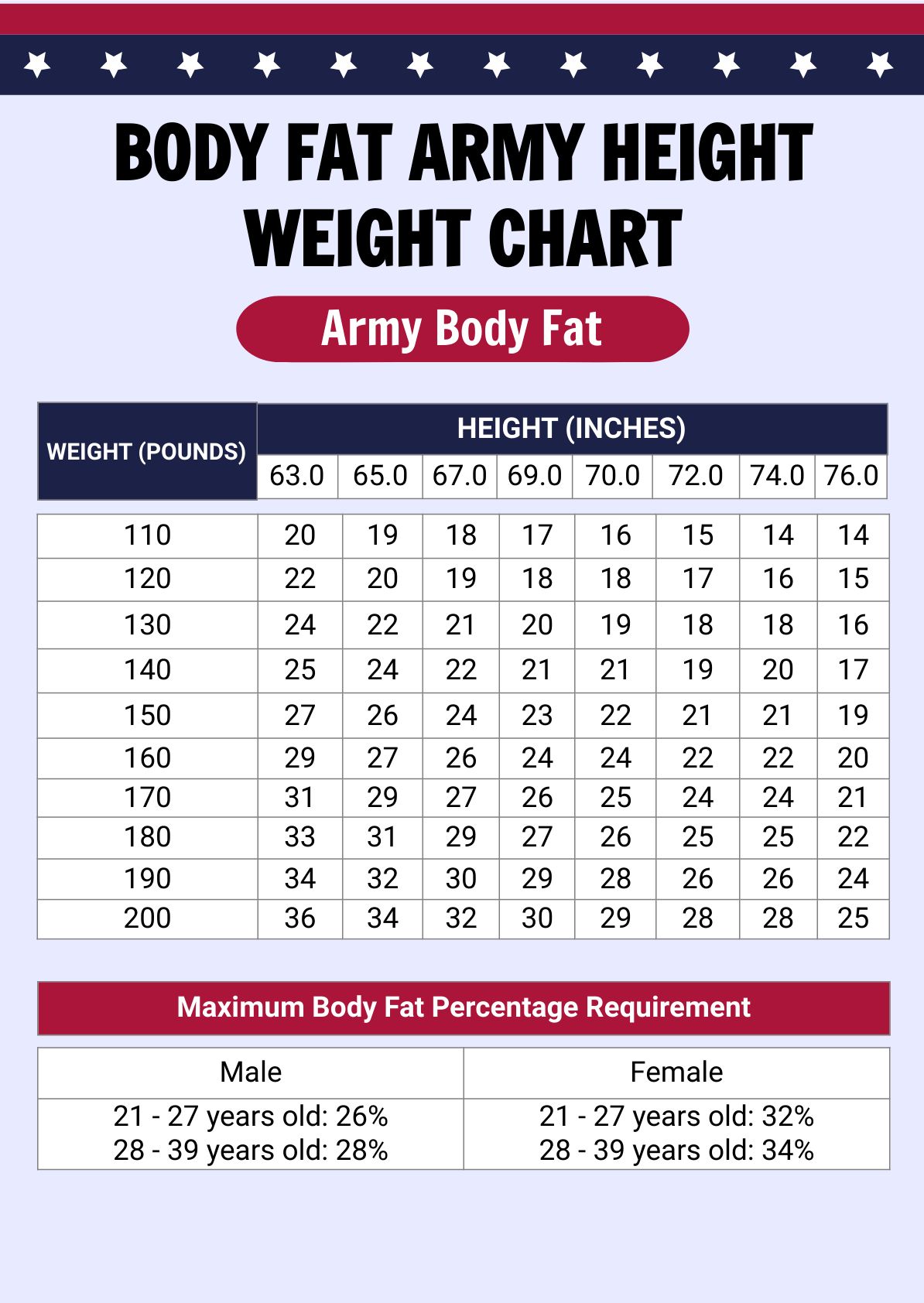When it comes to joining the army, one of the most critical factors to consider is the army weight requirements. These requirements are in place to ensure that all soldiers are physically capable of performing their duties effectively. In this article, we will explore the intricacies of army weight standards, the implications of meeting or not meeting these standards, and tips for maintaining a healthy weight throughout your military career.
Weight requirements vary based on various factors such as age, gender, and height. Understanding these nuances is essential for anyone considering a career in the military. Additionally, we will provide insights into how the army measures weight and body fat percentage, and the consequences of failing to meet these standards.
Finally, this guide aims to empower potential recruits with the knowledge they need to succeed in meeting the army's weight requirements. Whether you are a new recruit or someone contemplating military service, this comprehensive overview will equip you with the information necessary to navigate the physical demands of army life.
Table of Contents
- Understanding Army Weight Requirements
- Measurement Methods Used by the Army
- Body Fat Percentage Standards
- Health Implications of Weight Standards
- Tips for Meeting Weight Requirements
- Consequences of Non-Compliance
- Support Resources for Recruits
- Conclusion
Understanding Army Weight Requirements
The army establishes specific weight requirements that vary by age, gender, and height. These standards are designed to ensure that all personnel are fit for duty and can handle the physical demands of military life. Here are some key points regarding army weight requirements:
- Weight standards are based on height and body composition.
- Different branches of the military may have slightly different standards.
- Meeting the weight requirements is crucial for enlistment and retention.
Weight Standards for Different Branches
While the Army, Navy, Air Force, and Marines may have similar underlying principles, their specific weight requirements can differ. It's essential to consult the specific branch's guidelines when assessing your eligibility.
Age and Gender Considerations
Weight requirements are not one-size-fits-all. They vary based on the individual's age and gender. For instance, younger recruits typically have slightly higher weight limits compared to older personnel. This differentiation acknowledges the natural changes in body composition that occur with age.
Measurement Methods Used by the Army
The army employs specific methods to measure weight and assess body fat. Understanding these methods is essential for recruits aiming to meet the standards.
Weight Measurement
Weight is measured using standard scales. Recruits are typically weighed during the enlistment process and periodically thereafter. It's crucial to ensure that the weighing conditions are consistent, such as wearing the same type of clothing each time.
Body Fat Measurement
In addition to weight, the army measures body fat percentage using various methods, such as:
- Waist circumference measurement
- Body fat calipers
- Bioelectrical impedance analysis
These measurements provide a more comprehensive view of a recruit's fitness level, as they account for muscle mass versus fat mass.
Body Fat Percentage Standards
The army sets specific body fat percentage standards that recruits must meet. These standards are based on gender and age groups. For example:
- Men aged 17-20: Maximum 20% body fat
- Women aged 17-20: Maximum 30% body fat
Understanding these standards is vital for recruits as they prepare for their fitness assessments.
Health Implications of Weight Standards
Maintaining a healthy weight is not only crucial for meeting army requirements but also for overall health and wellness. Studies have shown that being overweight or underweight can lead to various health issues, such as:
- Increased risk of chronic diseases
- Reduced physical performance
- Negative impacts on mental health
By adhering to the army's weight requirements, recruits can enhance their physical capabilities and overall well-being.
Tips for Meeting Weight Requirements
For those looking to meet the army's weight requirements, here are some practical tips:
- Maintain a balanced diet rich in fruits, vegetables, and lean proteins.
- Engage in regular physical activity, including strength training and cardiovascular exercises.
- Stay hydrated and avoid excessive consumption of sugary drinks.
- Consult with a nutritionist or fitness coach for personalized guidance.
Consequences of Non-Compliance
Failing to meet the army's weight requirements can have serious implications for recruits. Some potential consequences include:
- Ineligibility for enlistment or promotion
- Potential discharge from the military
- Impact on career advancement opportunities
Understanding these consequences can motivate recruits to adhere to the weight standards and prioritize their health.
Support Resources for Recruits
The army provides various resources for recruits seeking to meet weight requirements, including:
- Fitness training programs
- Nutritional counseling services
- Peer support groups
Utilizing these resources can significantly aid individuals in achieving their weight and fitness goals.
Conclusion
In summary, understanding army weight requirements is crucial for anyone considering a military career. By adhering to these standards and maintaining a healthy lifestyle, recruits can enhance their chances of success in the army. We encourage readers to take the necessary steps to meet these requirements and seek support when needed.
If you found this article helpful, please leave a comment below, share it with others, or explore more articles on our site related to military service and health.
References
- Department of Defense. (2021). Military Weight Control Program.
- Cleveland Clinic. (2022). Importance of Maintaining a Healthy Weight.
- Centers for Disease Control and Prevention. (2023). Body Mass Index (BMI) Calculator.
You Might Also Like
Exploring The Life And Career Of Christina VignaudNatalie Marella: The Rising Star In The Entertainment Industry
Exploring The Life And Career Of John Gould Rubin
Exploring Brian Kilmeade's Home: A Peek Into The Life Of A Celebrated Journalist
Contact CrypticStreet.com: Your Gateway To Unraveling Mysteries
Article Recommendations
- Jason Luv Yumi Eto Latest Updates News
- Ella Langley And Riley Green Dating Rumors Is It True
- Gruesome Quiero Agua Gore Video Disturbing Footage


